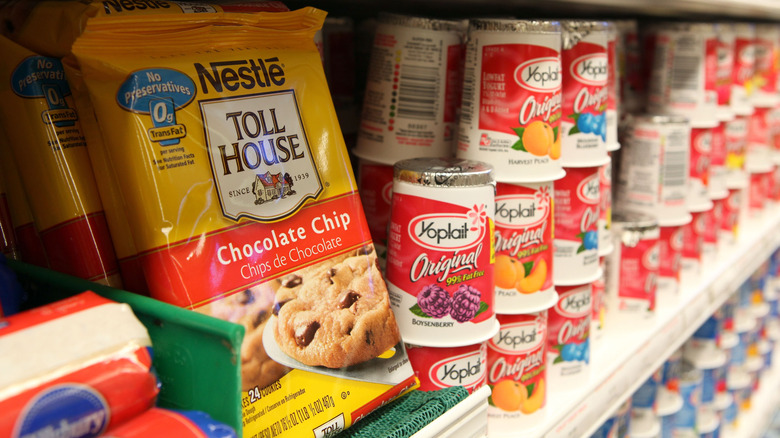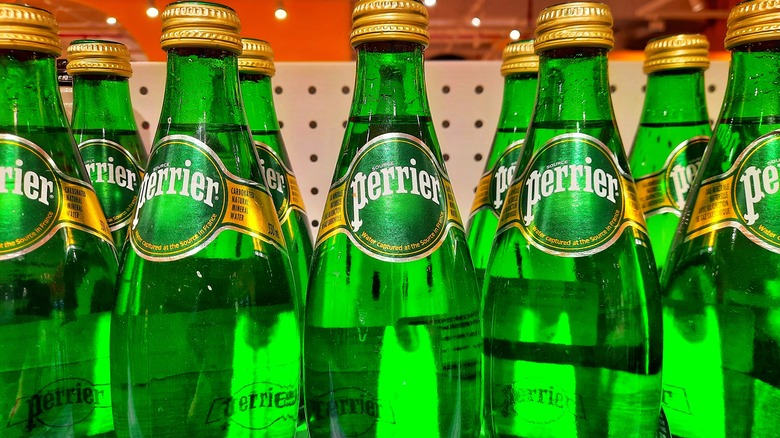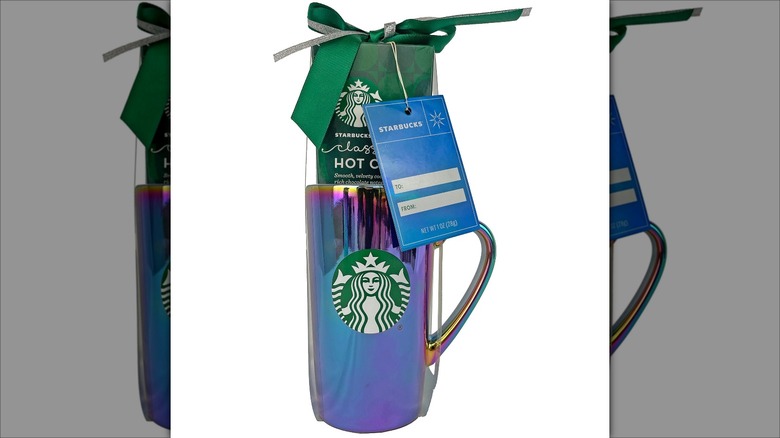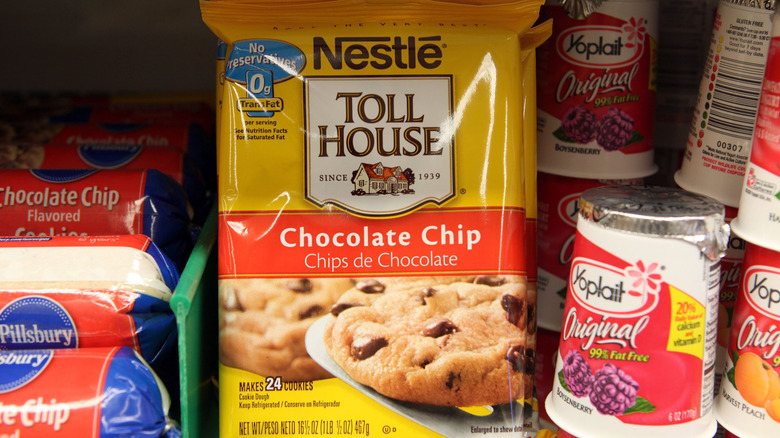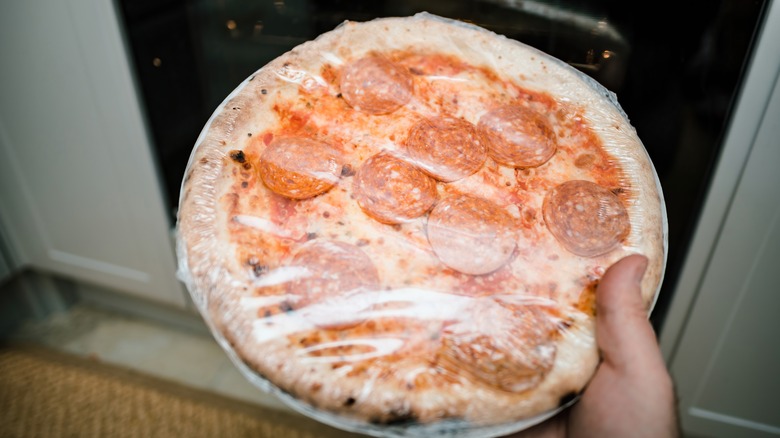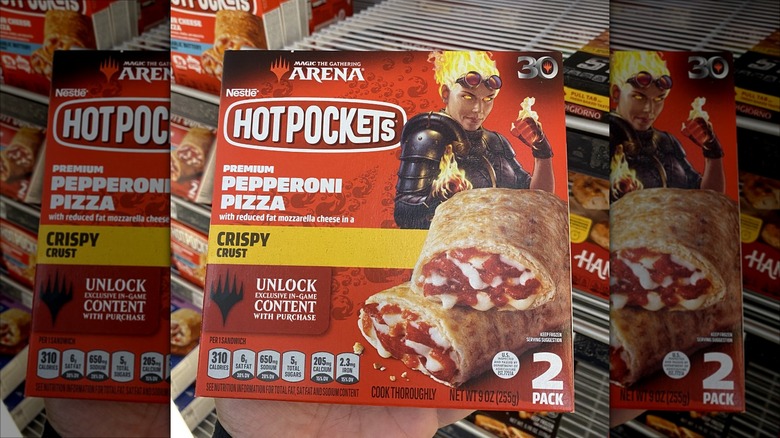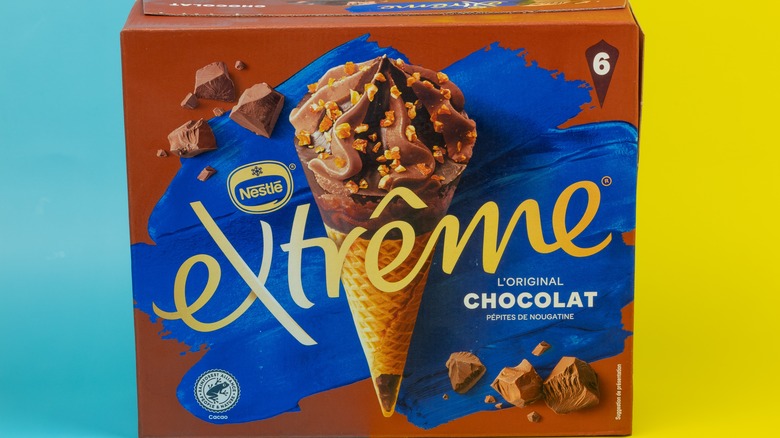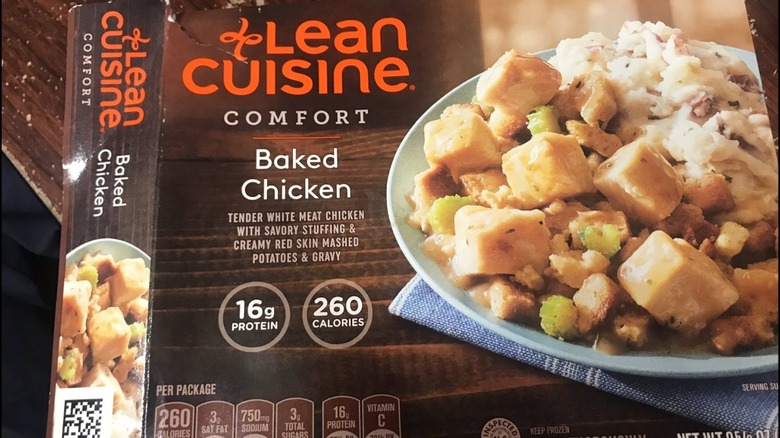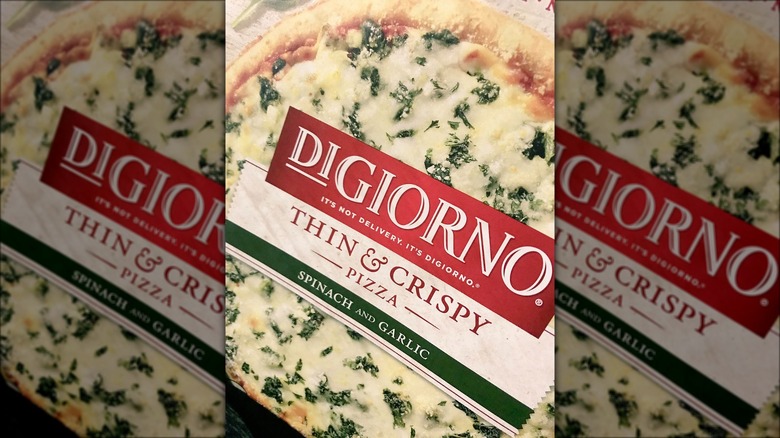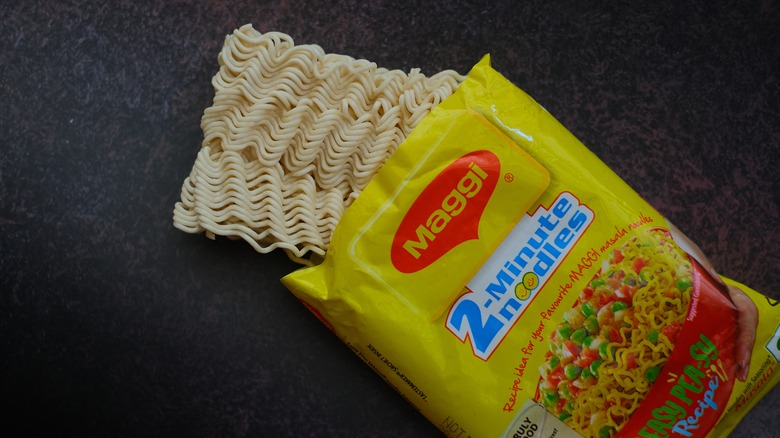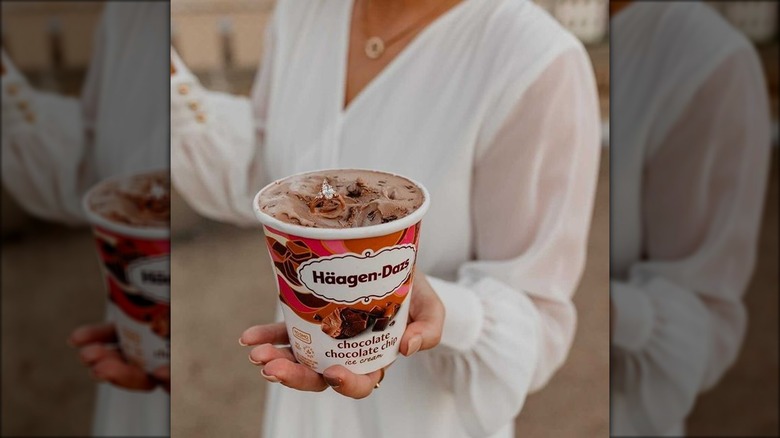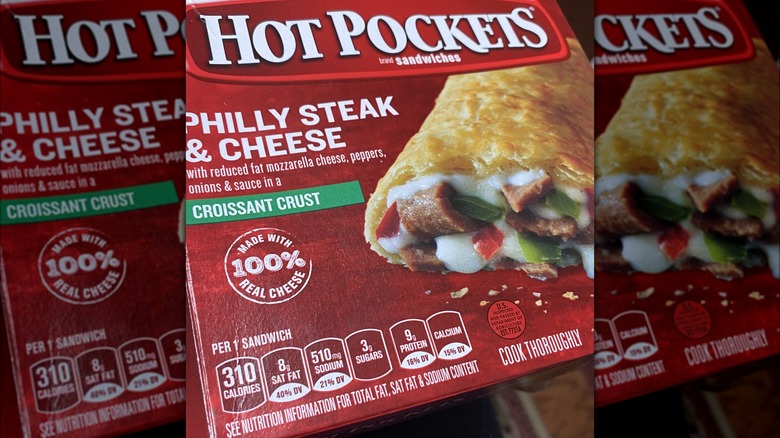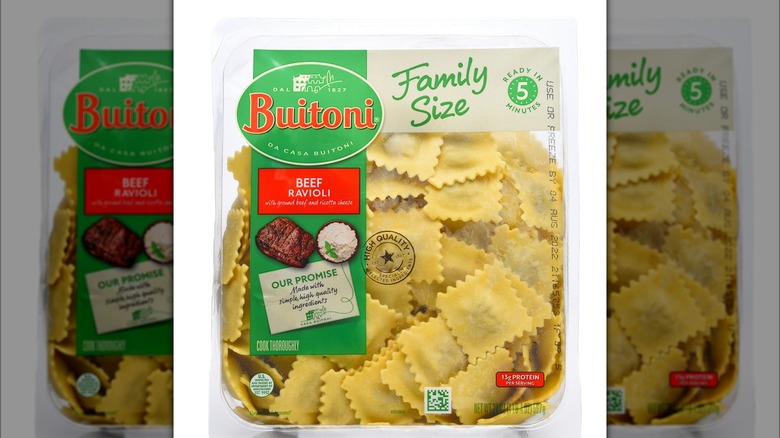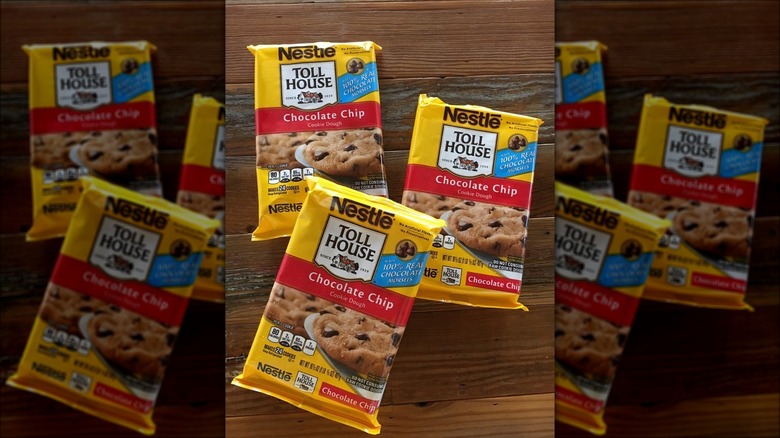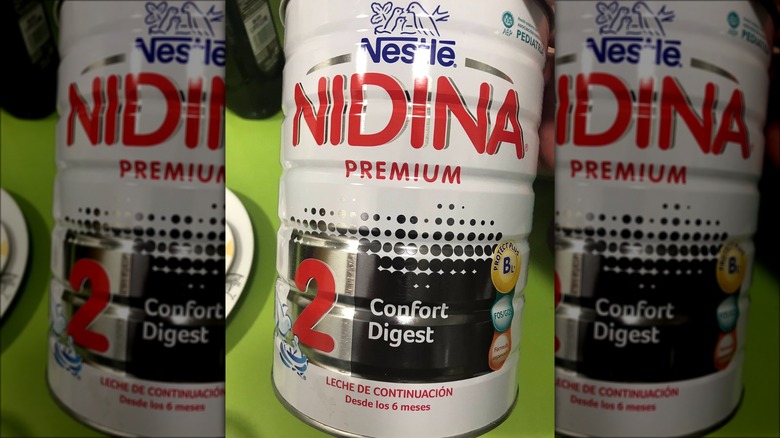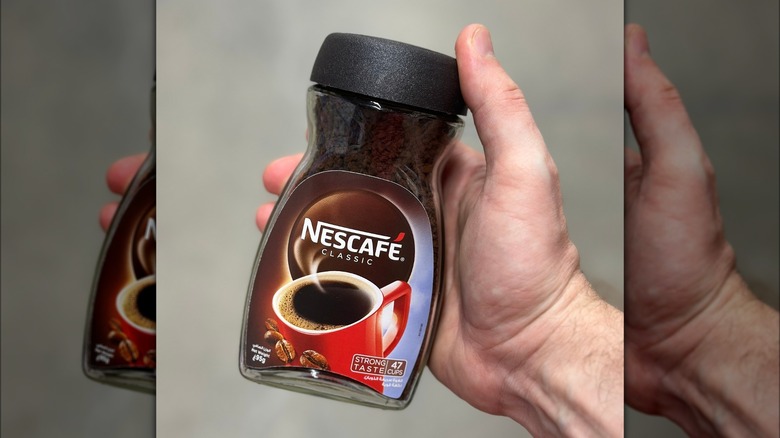The Biggest Recalls In Nestlé History
Product recalls are kind of like the rain of the food industry — unpleasant and somewhat possible to avoid, but ultimately inevitable. Try though businesses may to mitigate the risk of contamination, inaccurate allergen warnings, or the presence of foreign objects like metal and plastic (which, yes, happens more than you may think), accidents can happen at any point in the supply chain. This is why you may be inundated with the occasional warning to throw out your recently purchased groceries, stat.
When a business has as many moving parts as Nestlé, avoiding recalls is even more challenging. Founded in 1866, the Swiss food and drink conglomerate boasts over 2,000 brands, including the likes of Nescafé, KitKat, Toll House, and San Pellegrino. Several of these have been forced to pull products from circulation in the past, sometimes affecting as many as millions of items at a time. From cookie dough to Hot Pockets, these are some of the most extreme in the company's history.
1. Perrier Water (2024)
Water seems like one of those food and drink items that's impossible to mess up — and yet Nestlé was forced to destroy over 2 million bottles of Perrier in April 2024. This followed an immediate warning from local authorities to stop all operations at one of its water extraction points in Vergèze, France. Storm Monica had previously hit the area in March, which was determined to have contaminated the water with "germs indicative of contamination of fecal origin (coliforms, Escherichia coli), but also by germs of the species Pseudomonas aeruginosa" (via Le Monde).
With the presence of E. coli posing a potential major health risk to consumers, Nestlé had no choice but to scrap the water it had already bottled. Fortunately, none of these bottles had actually reached consumers yet, which made the recall slightly easier. However, it was still a heavy blow, especially for a brand like Perrier that's already faced its fair share of controversy. Back in the 1990s, before Nestlé owned the brand, Perrier was hit by a cataclysm of bad PR after small traces of the cancer-causing chemical benzene sparked a huge recall, and it admitted that its water wasn't "naturally sparkling" like it previously claimed (via The Washington Post).
2. Nestlé Starbucks Holiday Mugs (2024)
One of Nestlé's recalls in 2024 wasn't even food-related. In March 2024, warnings were issued for anyone who had purchased one of four kinds of Starbucks holiday mug gift sets. Sold at Target, Walmart, and Nexcom military outlets, these sets were produced by Nestlé and contained a mix of coffee, hot cocoa, and Starbucks-branded, metallic-coated mugs — both of which had proven to be potentially dangerous.
As per the United States Consumer Product Safety Commission, these mugs were linked to at least 12 incidents in which they overheated or broke. In turn, these accidents had led to 10 injuries, including nine severe burns or blisters and one cut. One of these injuries even required medical attention. In a mission to prevent further injuries, a total of 440,500 mugs were recalled across the U.S. Consumers were asked to bring the mug back to the point of purchase or contact Nestlé ASAP in exchange for cash or a gift card.
3. Nestlé Toll House Chocolate Chip Cookie Dough (2022 and 2023)
When you rip open a packet of store-bought cookie dough, you only expect to find one kind of chip: chocolate. In August 2023, however, some consumers discovered wood chips inside their cookie dough. While fortunately nobody was injured, Nestlé swiftly recalled select batches of its Toll House "Break and Bake" Cookie Dough.
This only affected chocolate chip varieties of the cookie dough that were produced on April 24 or April 25, 2023. What made the recall all the more concerning was the fact that this was the second time in less than a year that foreign objects made their way into Nestlé Toll House Cookie Dough. In October 2022, it was forced to withdraw all Chocolate Chip Cookie Dough with Fudge Filling made between June and September of that same year after reports of white plastic pieces in some products. We're all for adding extra ingredients to spice up our cookies, but wood and plastic may be taking things a bit too far.
4. Buitoni Fraîch'Up Pizzas (2022)
In 2022, an E. coli outbreak swept across France, infecting at least 56 people, causing 50 cases of Hemolytic Uremic Syndrome (HUS) — a type of kidney failure — and killing two young children. The outbreak was traced back to the dough of Fraîch'Up frozen pizzas from Buitoni, one of the many brands in Nestlé's portfolio. An immediate recall notice was issued, affecting all Fraîch'Up frozen pizzas in France, plus Slovenia and Luxembourg.
Considering its severity, this recall came with some serious repercussions for Nestlé. In March 2023, it closed down the plant in Caudry, France that was involved in the outbreak. It also agreed to pay compensation to the victims. A year later, Nestlé revealed that Nestlé France and Société des Produits Alimentaires de Caudry (SPAC), a subsidiary of Nestlé, were facing criminal charges in relation to the outbreak.
5. Hot Pockets Premium Pepperoni Pizza (2021)
Contamination was once again a fear in January 2021 when Nestlé recalled approximately 762,615 pounds of Hot Pockets Premium Pepperoni Pizza, all produced between November 13 and November 16, 2020. This came in the wake of four complaints from customers who'd started chowing down on their Hot Pockets, only to find tiny shards of glass and hard plastic in their food.
Unsurprisingly, one of these customers also reported a minor oral injury from these unwanted bonus ingredients. In the grand scheme of things, Nestlé was lucky that the damage stopped there; the Food Safety and Inspection Service (FSIS) declared it a Class 1 recall, aka a high-health risk in which there's "a reasonable probability that the use of the product will cause serious, adverse health consequences or death." Nestlé — which inherited the brand after purchasing Chef America Inc. in 2002 — quickly issued an apology, stating, "The quality, safety and integrity of Nestlé USA and Hot Pockets products remain our number one priority. We sincerely apologize for any inconvenience this action represents to both our consumers and retail customers."
6. 46 flavors of Nestlé-branded ice cream (2021)
Summer is supposed to be peak ice cream season, yet in 2021, Nestlé had no choice but to recall 46 different varieties in Spain. The decision came after its ice cream manufacturer Froneri discovered the chemical ethylene oxide — which has been linked to DNA damage and cancers such as lymphoma and breast cancer — in its stabilizing additive.
The ice creams affected included everything from those sold under the Milka and Oreo banner to Nestlé Extrême. Considering the huge number of products recalled, Nestlé set up a search engine to help customers know if their summer treats were at risk. Froneri emphasized that there were only trace amounts of ethylene oxide in each product, which "even in the case of consumption of a product that could be affected by this incident, and based on external and in-house analysis, it is highly unlikely that it will pose a risk to consumer health" (via Euro Weekly News). However, it did also admit that there was a possible health risk for those who undertook "continued consumption in large doses."
7. Lean Cuisine Baked Chicken (2020)
It seems like plastic has an unerring skill for ending up where it shouldn't in the food industry. In December 2020, tiny pieces of hard white plastic somehow finessed their way into boxes of Lean Cuisine Baked Chicken, one of many varieties of frozen meals offered by the Nestlé-owned brand.
Five consumers had reported digging into the plastic by the time Nestlé initiated its recall. Said recall affected a whopping 92,206 pounds of frozen meals, which the Food Safety and Inspection Service (FSIS) explained had been contaminated by pieces of plastic that broke off the conveyor belt during production, ending up in the red skin mashed potatoes portion of the meal. Fortunately, nobody reported any injuries from a side of plastic with their chicken and potatoes, but with the recall defined as a Class I (aka those posing the highest health risks), customers were still urged to throw away or return any boxes at the earliest convenience.
8. DiGiorno, Lean Cuisine, and Stouffer's products (2016)
It's rare that you hear someone telling you not to eat spinach, but that was exactly what Nestlé did in March 2016. A major recall impacted several products across DiGiorno, Lean Cuisine, and Stouffer's — ranging from Spinach and Garlic Pizza to Ricotta and Spinach Ravioli — due to the fact that the company had received complaints of glass in their food, and all the affected products had the leafy green superfood in common.
While the products in question were manufactured at various spots around the U.S., a spokesperson for Nestlé later confirmed to ABC that the spinach all came from the same source. Luckily, nobody reported an actual injury from the glass, which is a miracle in itself. Roughly 3 million packages were recalled, with consumers asked to throw out or return their frozen meals regardless. That's a lot of wasted spinach.
9. Maggi Instant Noodles (2015)
Maggi may have been founded in Switzerland, but the brand — renowned for its instant noodles and soups — today boasts its biggest market share in India. Back in May 2015, however, customers were forced to go Maggi-free for months on end when the brand was temporarily banned after they were found to contain a lead concentration of 17.2 parts per million (ppm) in each packet, nearly seven times the permissible amount.
Nestlé was subsequently forced to pull all Maggi products off the shelves in India, with the recall proving challenging for logistical reasons. It maintained that the tests were inaccurate and its lead levels were safe. "Trust has been shaken and, therefore, it is not conducive to have our product on the shelf, we felt, in spite of the product being safe," said Paul Bulcke, Nestlé's CEO at the time (via The New York Times). After multiple additional rounds of testing, Maggi returned to grocery stores in November — but not before Nestlé was reported to have lost $127 million, plus potentially billions more in brand damage.
10. Häagen-Dazs Chocolate Chocolate Chip Ice Cream (2014)
When Nestlé recalled 10,000 packages of Häagen-Dazs Chocolate Chocolate Chip Ice Cream in 2014, it wasn't because glass, plastic, or wood had worked their way into each tub. Instead, it was feared that those with a peanut allergy might get their hands on the ice cream instead.
The issue was that Nestlé — which counts Häagen-Dazs as one of its brands through Froneri, its joint venture with PAI Partners – realized it had mismatched the flavors and nutritional information on said ice cream. The brand had discovered that its 14-ounce cartons labeled as Häagen-Dazs Chocolate Chocolate Chip actually contained Häagen-Dazs Chocolate Peanut Butter, which (surprise, surprise) contained peanuts. As Nestlé warned, those with an allergy or sensitivity to peanuts risked a serious — potentially even fatal — allergic reaction if they consumed the ice cream, hence the urgency to recall all tubs ASAP.
11. Hot Pockets Philly Steak & Cheese (2014)
Some recalls can have a huge knock-on effect on other food products. The Hot Pockets recall of 2014 is a great example. Announced by Nestlé in February 2014, the announcement came in the wake of a bigger announcement from Rancho Feeding Corporation, a slaughterhouse in California that ceased all operations after being accused of buying and processing diseased animals for meat, including potentially cancerous cows.
As per the USDA, this left the finished product "unfit for human food," although fortunately there were no reports of illness linked to the meat (via CNBC). A hefty 8.7 million pounds of beef recalled, and multiple brands were affected — including Philly Steak & Cheese Hot Pockets. Nestlé recalled a total of 238,000 cases, warning guests to check their freezer for the frozen meals, then either throw them away, return them for a refund, or call Nestlé's consumer services line.
12. Buitoni Beef Ravioli and Beef Tortellini (2013)
Back in 2013, Europe was plunged into the depths of a horse meat scandal. Multiple meat items were exposed for not containing 100% beef as advertised, with a significant percentage — sometimes even 100%– of each product actually composed of horse. While the scandal was primarily centered on items sold in Irish and British supermarkets, other countries weren't totally immune from the fallout. When it comes to Nestlé, Italy and Spain were the epicenter of the crisis, with two beef products recalled. Both Buitoni Beef Ravioli and Beef Tortellini were pulled from shelves after being found to contain horse meat, as was Lasagnes à la Bolognaise Gourmandes, a frozen meal supplied to caterers in France.
"Our tests have found traces of horse DNA in two products made from beef supplied by H.J. Schypke," Nestlé said in a statement (via CNN). "The levels found are above the one percent threshold the U.K.'s Food Safety Agency uses to indicate likely adulteration or gross negligence." It also stressed that the meat — which it had procured from a German supplier — was not used in any of its U.S. products.
13. Nestlé Toll House Chocolate Chip Cookie Dough (2009)
One of the biggest scandals to hit Nestlé Toll House Cookie Dough took place in June 2009 when it recalled 3.6 million packages due to an outbreak of E. coli infections, impacting over 70 people in 30 states, and causing 10 patients to contract hemolytic uremic syndrome (HUS). This in itself raised eyebrows, with epidemiologist Dr. Timothy F. Jones telling The New York Times that they were baffled how E. coli — which is most often found in meat and dairy — ended up in cookie dough. Ultimately, a study in Clinical Infectious Diseases by the Centers for Disease Control and Prevention and state health departments found that flour was the most likely culprit. Unlike all the other ingredients, such as pasteurized eggs and molasses, the flour was at no point treated in a way that would kill pathogens.
Baking it would have likely done the trick, but multiple victims reported eating the cookie dough raw, with some purchasing it for that sole purpose. Nestlé subsequently emphasized that its cookie dough was not intended to be eaten raw, with a warning label explicitly saying, "Bake before consuming." However, the study's authors insisted that the fault lay in Nestlé's hands. "Making the snacks safer may be the best outcome," they wrote. "Manufacturers of cookie dough should consider reformulating their product to make it as safe as a ready-to-eat product." Seven years later, Nestlé did just that, introducing Chocolate Chip Edible Cookie Dough.
14. Latte Mio and Nidina 1 and 2 (2005)
In November 2005, routine tests sparked an urgent recall of over 520,000 gallons of Nestlé baby milk. The products in question were Latte Mio and Nidina 1 and 2, which are intended to provide the nutrients and vitamins that support an infant's growth and development.
This was another classic case of contamination — although this time, it wasn't plastic or glass sparking a frenzy. Instead, the tests had found that traces of isopropylthioxanthone (ITX) from ink that was thought to have transferred from the packaging to the milk. Italy, France, Spain, Portugal, and Greece were all hit by the recall, with Italy suffering the heaviest blow. As per CNN, Italy's Ministry of Agriculture claimed to have confiscated 30 million liters of the baby formula (although Nestlé denied these claims and said it had only confiscated 2 million liters).
Nestlé was quick to clarify that external tests had found that ITX wasn't present in the milk and that it didn't pose a health risk, but that it was willing to go along with the recall anyway. "The production method has already been changed to avoid any future risk of ITX finding its way into food products," it added (via Edie). However, the incident was still a blow to Nestlé's reputation in the baby milk market, where it had which had already faced decades of criticism for pushing formula over breastmilk.
15. Nescafé Original (2001)
Coffee lovers in the U.K. were the victims of a major Nestlé recall in April 2001. The company was forced to pull 250,000 jars of Nescafé Original coffee granules after a customer complained about finding metal shavings in their jars. Upon investigation, it was found that several other jars also contained small amounts of metal.
While this metal was likely limited to a handful of products in total, Nestlé decided to be extra cautious and recall all products manufactured on the same day as those containing metal. It later gave a rough idea of how the metal found its way into the coffee in the first place. "Information available at this point in time indicates an isolated incident on the filling operation," a spokesperson said (via the BBC).
Unfortunately, this wasn't the last time something like this happened to Nescafé. Nine years later, a similar recall struck Nescafé Espresso, Alta Rica, and Cap Colombie varieties in the U.K., Canada, Ireland, South Africa, Singapore, Saudi Arabia, and more after small shards of glass were found in some jars.
